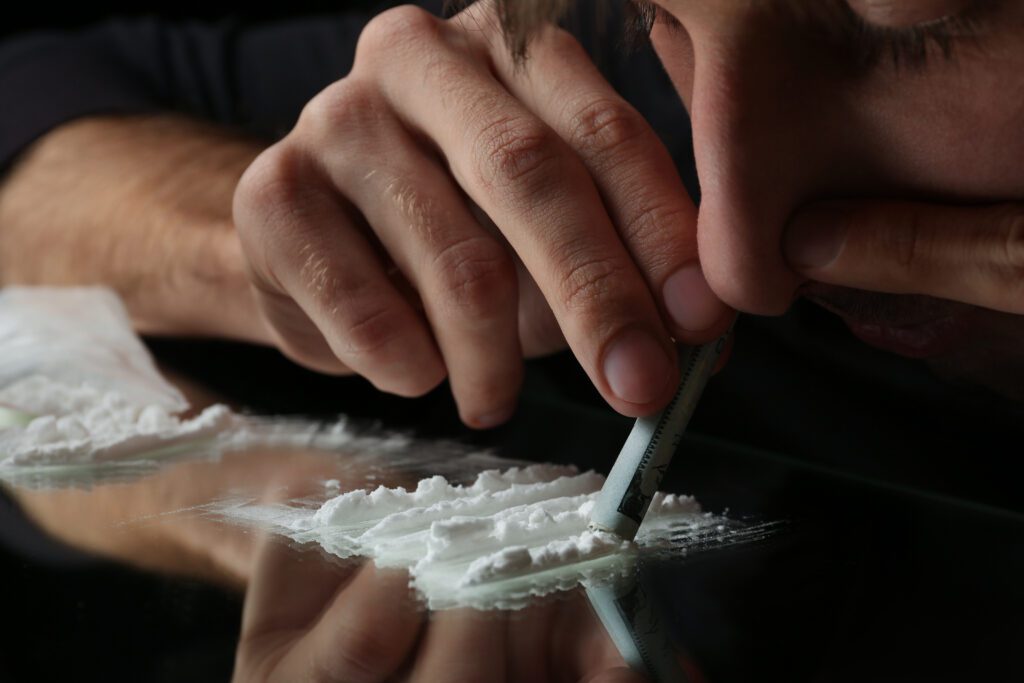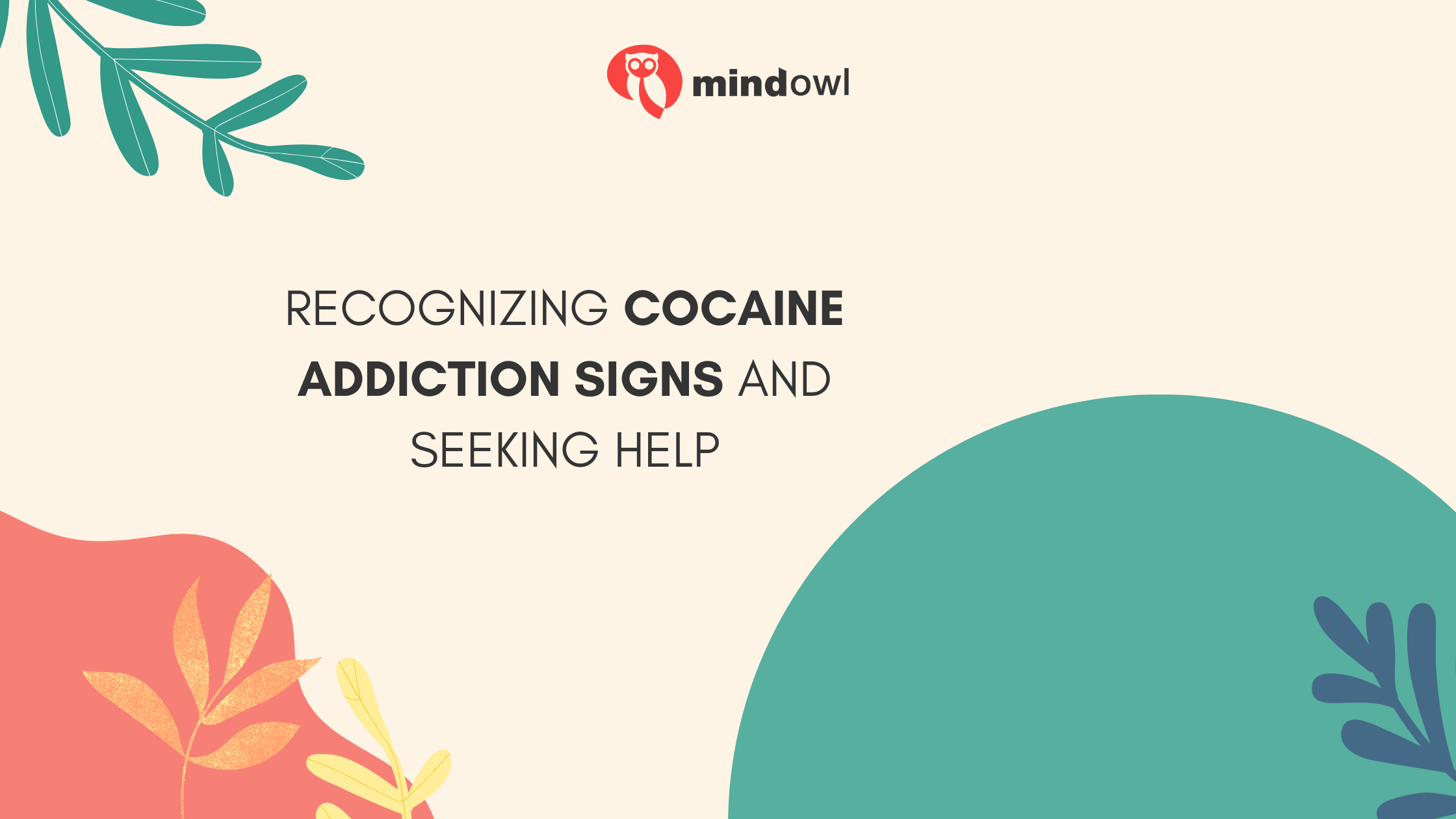
Is cocaine addiction controlling your life? This powerful drug can quickly spiral into a destructive habit, leaving you trapped in a cycle of addiction. The initial thrill can quickly turn into a nightmare, affecting your physical and mental health, as well as your relationships.
That’s why recognizing the signs of cocaine addiction is crucial to breaking free from its grip. This article will discuss the key indicators of cocaine addiction, explore the underlying causes, and provide guidance on seeking professional help.
Understanding Cocaine and Its Effects
Cocaine is derived from the coca plant and acts as a powerful central nervous system stimulant. It is most consumed by snorting, injecting, or smoking in its processed form, crack cocaine. The drug produces a short-lived but intense euphoric high, accompanied by increased energy, heightened alertness, and a sense of confidence.
However, these pleasurable effects come at a significant cost, as cocaine wreaks havoc on physical health, mental well-being, and interpersonal relationships. For those caught in the cycle of addiction, residential cocaine addiction treatment offers a structured and supportive environment to address the profound impacts of the drug and begin the journey toward recovery.
The Physical Impact
The immediate effects of cocaine use can include elevated heart rate, dilated pupils, increased blood pressure, and hyperactivity. Prolonged use leads to more severe physical consequences, including cardiovascular issues, respiratory problems, and damage to nasal tissue or lungs (depending on the method of consumption). Cocaine’s toll on the body often accelerates with addiction, increasing the risk of fatal overdose.
The Psychological Impact
Cocaine use significantly affects brain chemistry, particularly dopamine production. The ‘high’ results from a flood of dopamine in the brain, but this mechanism leads to tolerance, dependency, and withdrawal symptoms over time. The psychological effects include anxiety, paranoia, irritability, and even hallucinations. Prolonged use can exacerbate underlying mental health conditions and create cycles of depression and agitation.
The Social Consequences
Cocaine addiction frequently disrupts professional, personal, and social dynamics. Individuals may neglect responsibilities, experience financial troubles, and engage in risky or unethical behaviors to sustain their drug use. Strained relationships and social isolation often follow, compounding the emotional burden of addiction.
Recognizing the Signs of Cocaine Addiction
Cocaine addiction can be insidious, often developing subtly before becoming an undeniable problem. Recognizing the signs of cocaine addiction is crucial for early intervention and treatment. Cocaine affects the mind and body in profound ways, and its abuse manifests in physical, behavioral, and psychological symptoms that can disrupt every aspect of life. Here’s a detailed exploration of the signs to watch for:
Physical Symptoms of Cocaine Addiction
Cocaine’s stimulant effects impact various bodily systems, leading to noticeable physical changes. These cocaine addiction symptoms can range from subtle to severe, depending on the frequency and duration of use.
1. Weight Loss and Appetite Suppression
Cocaine often acts as an appetite suppressant, leading to noticeable and unintended weight loss. Individuals may appear gaunt or malnourished due to prolonged use.
2. Dilated Pupils and Sensitivity to Light
One of the immediate effects of cocaine use is dilated pupils. This symptom is often paired with increased sensitivity to light.
3. Frequent Nosebleeds or Nasal Problems
Snorting cocaine damages the nasal passages, often causing chronic nosebleeds, nasal congestion, and, in severe cases, the erosion of the nasal septum.
4. Heart Issues
Cocaine elevates heart rate and blood pressure, which can result in chest pain, irregular heartbeat, or palpitations. Prolonged use increases the risk of heart attacks and other cardiovascular complications.
5. Fatigue and Exhaustion
After the intense high from cocaine subsides, individuals often experience ‘crashes,’ marked by extreme fatigue, lethargy, or prolonged sleep.
6. Track Marks or Skin Damage
For those who inject cocaine, visible track marks on the arms or other injection sites may be evident. Skin damage or sores can also result from repeated injections or compulsive scratching due to drug-induced sensations.
Recognizing the physical toll of cocaine addiction early can help prevent severe health consequences and pave the way for recovery.
Behavioral Symptoms of Cocaine Addiction
Behavioral changes are often the most apparent signs of addiction, as they affect daily routines, relationships, and decision-making.
1. Obsessive Drug-Seeking Behavior
Addiction drives individuals to prioritize obtaining and using cocaine above all else, often leading to neglect of work, school, or family obligations.
2. Secrecy and Isolation
Individuals may withdraw from family and friends, become unusually secretive about their whereabouts, or lie about their activities. They might spend long periods alone or disappear without explanation.
3. Increased Risk-Taking
Cocaine use impairs judgment, leading to reckless behaviors such as driving under the influence, unsafe sexual practices, or illegal activities to finance drug purchases.
4. Erratic or Hyperactive Behavior
The drug’s stimulant effects often cause bursts of hyperactivity, erratic movements, or an inability to sit still. This behavior is typically followed by periods of exhaustion and withdrawal.
5. Financial Problems
Addiction often leads to poor financial decisions, including overspending or borrowing money frequently. Missing valuables or stolen items may indicate attempts to fund the habit.
6. Neglect of Responsibilities
Individuals addicted to cocaine may show a decline in work performance, skip important appointments, or neglect personal hygiene and self-care.
Changes in behavior often serve as the most visible warning signs, underscoring the urgency of seeking help before addiction worsens.
Psychological Symptoms of Cocaine Addiction
Cocaine profoundly affects the brain, altering mood, perception, and emotional stability. These psychological signs are often distressing for both the individual and their loved ones.
1. Mood Swings and Irritability
Cocaine use can lead to sudden and unpredictable mood changes. Users may shift from euphoric highs to aggressive outbursts or agitation without clear triggers.
2. Anxiety and Paranoia
Prolonged cocaine use can cause heightened anxiety and irrational fears. Paranoia is a common symptom, with individuals often feeling watched or persecuted without reason.
3. Hallucinations and Delusions
In extreme cases, users may experience sensory distortions, such as hallucinations or delusional thoughts, particularly during binge use or withdrawal periods.
4. Depression and Suicidal Thoughts
The crash following a cocaine high is often characterized by feelings of hopelessness, low energy, and despair. Repeated cycles of highs and crashes can exacerbate depressive tendencies.
5. Compulsive Behavior
Addiction often leads to compulsive drug use, even when individuals are aware of the negative consequences on their health, relationships, and life circumstances.
Understanding the psychological effects of cocaine use can illuminate the emotional struggles faced by those in addiction and highlight the need for professional intervention.
Social and Interpersonal Signs of Cocaine Addiction
Cocaine addiction doesn’t just affect the user—it impacts their relationships and social interactions as well.
1. Strained Relationships
Addiction often leads to conflict with family, friends, or partners due to neglect, dishonesty, or erratic behavior. Trust issues may arise as a result of repeated broken promises or lies.
2. Social Isolation
Users may withdraw from previously enjoyable social activities or limit interactions to others who enable or share their drug use.
3. Legal Troubles
Cocaine use and the behaviors associated with addiction often lead to legal problems, such as arrests for possession, DUIs, or theft-related charges.
Addressing the social impacts of cocaine addiction is vital for restoring relationships and rebuilding a support network for recovery.
The Importance of Early Intervention
Early intervention in cocaine addiction is critical for mitigating its devastating effects on physical health, mental well-being, and social stability. Addiction is a progressive condition, meaning that without timely action, the consequences often intensify, leading to more entrenched dependency, severe health issues, and greater disruption to personal and professional life. Identifying the problem and addressing it as soon as possible can significantly improve outcomes and reduce long-term harm.
1. Preventing Escalation
One of the key benefits of early intervention is preventing the escalation of cocaine addiction. As tolerance develops, individuals require larger doses to achieve the same effects, increasing the likelihood of overdose and severe health complications. Early action can halt this progression, sparing individuals from the more dangerous stages of addiction. Americans who want to detox in a safe environment frequently check into residential treatment centers in Hawaii that allow them to receive care away from familiar triggers and negative influences. These centres offer medical supervision, emotional support, and a peaceful setting ideal for focusing entirely on recovery.
2. Minimizing Physical and Mental Damage
Prolonged cocaine use can lead to irreversible damage to the heart, brain, and other vital organs, as well as exacerbate or trigger mental health disorders such as anxiety, depression, and psychosis. Acting early can limit these adverse effects, preserving both physical and mental health.
3. Preserving Relationships and Stability
Cocaine addiction often damages relationships, disrupts careers, and creates financial instability. Early intervention can help individuals address their addiction before these aspects of their lives are irreparably harmed, maintaining their support network and daily stability.
4. Breaking Through Denial
Denial is a common barrier to seeking help, as individuals often underestimate the severity of their addiction. Early intervention provides opportunities to confront these misconceptions, whether through self-reflection, conversations with loved ones, or professional evaluation.
5. Improving Recovery Outcomes
The sooner treatment begins, the greater the likelihood of a successful recovery. Early intervention allows individuals to access support, therapies, and resources before their addiction becomes deeply ingrained, improving the chances of long-term sobriety.
Early intervention in cocaine addiction saves lives, preserves health, and offers a brighter future to those struggling with substance abuse.

How to Seek Help for Cocaine Addiction
Seeking help for cocaine addiction is a critical step toward recovery. Addiction is a complex condition, but with the right approach, treatment, and support, it is possible to overcome. Below is a detailed guide to navigating the process of seeking help:
1. Acknowledge the Problem
Admitting that cocaine addiction is a problem is often the hardest step. Many people struggle with denial, rationalizing their behavior or downplaying the severity of their addiction. Overcoming this denial requires honest self-reflection and acknowledgment of how cocaine is affecting your life, health, and relationships. Taking this step lays the foundation for recovery, as it opens the door to seeking support and treatment.
2. Reach Out to Trusted Support Systems
Talking to someone you trust about your addiction can provide emotional relief and support. Confiding in a family member, friend, or mentor allows you to share your burden and begin building a network of accountability. These individuals can also offer encouragement, help you research treatment options, or accompany you during your first steps toward recovery. The support of loved ones can make a significant difference in maintaining motivation.
3. Consult a Healthcare Professional
Seeking professional help is essential for understanding the severity of your addiction and developing an appropriate treatment plan. Addiction specialists, psychologists, or general practitioners can assess your physical and mental health, provide a diagnosis, and guide you toward effective treatment options. This initial consultation may involve discussing your cocaine use history, current symptoms, and any underlying mental health concerns.
4. Explore Treatment Options
Treatment programs for cocaine addiction are varied and cater to different needs. Inpatient programs are intensive and provide a structured environment where individuals can focus entirely on recovery. These programs often include therapy, group sessions, and medical supervision. Outpatient programs, on the other hand, offer flexibility and are suitable for those who need to balance recovery with work or family responsibilities. Both options incorporate evidence-based therapies, such as Cognitive Behavioral Therapy (CBT), to help individuals address the underlying causes of their addiction and develop healthier coping strategies.
5. Consider Detoxification
Detoxification, or detox, is often the first step in the recovery process. This phase involves eliminating cocaine from your system, which can lead to withdrawal symptoms like fatigue, depression, and intense cravings. Detox is best conducted under medical supervision, as healthcare professionals can manage cocaine addiction symptoms and provide medications or therapies to make the process safer and more comfortable.
6. Join Support Groups
Support groups such as Cocaine Anonymous (CA) or Narcotics Anonymous (NA) provide a community of individuals who share similar struggles and goals. These groups follow structured programs that encourage sharing experiences, learning from others, and finding strength in shared accountability. Being part of a support group can help combat feelings of isolation and provide a source of encouragement throughout the recovery journey.
7. Address Co-Occurring Mental Health Conditions
Cocaine addiction often coexists with mental health issues like anxiety, depression, or post-traumatic stress disorder (PTSD). Addressing these conditions alongside addiction is essential for comprehensive recovery. Integrated treatment plans that include counseling, medication, and behavioral therapies can help individuals manage both their addiction and mental health issues effectively.
8. Develop a Relapse Prevention Plan
Recovery is an ongoing process, and preparing for potential challenges is crucial. A relapse prevention plan, typically created with the help of a therapist or counselor, identifies personal triggers and outlines strategies for avoiding or coping with them. This plan might include attending regular therapy sessions, staying connected to support groups, practicing stress management techniques, and fostering a healthy lifestyle. Having a plan in place provides clarity and confidence in navigating life post-treatment.
9. Leverage Online and Local Resources
Many organizations and programs provide valuable resources for individuals seeking help with addiction. Local community centers often host free or low-cost recovery programs, while online platforms offer virtual counseling sessions, addiction forums, and educational materials. Hotlines like the Substance Abuse and Mental Health Services Administration (SAMHSA) helpline in the U.S. can connect individuals to treatment centers and additional resources in their area.
Seeking help for cocaine addiction is a powerful step that marks the beginning of recovery. Each step is a commitment to change and growth, demonstrating the strength and determination needed to overcome addiction.
Conclusion
Remember, you are not alone in this fight. Seeking help is a sign of strength, not weakness. By acknowledging the problem and taking the first step towards recovery, you can reclaim your life and build a brighter future. Don’t let cocaine addiction dictate your destiny. Take control, seek professional help, and embark on a journey towards a healthier, happier you.
MindOwl Founder – My own struggles in life have led me to this path of understanding the human condition. I graduated with a bachelor’s degree in philosophy before completing a master’s degree in psychology at Regent’s University London. I then completed a postgraduate diploma in philosophical counselling before being trained in ACT (Acceptance and commitment therapy).
I’ve spent the last eight years studying the encounter of meditative practices with modern psychology.

